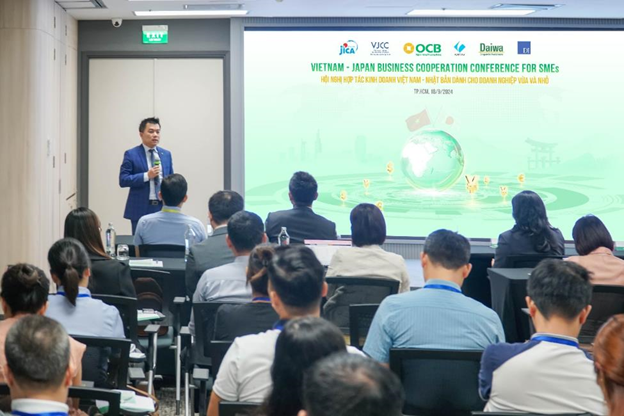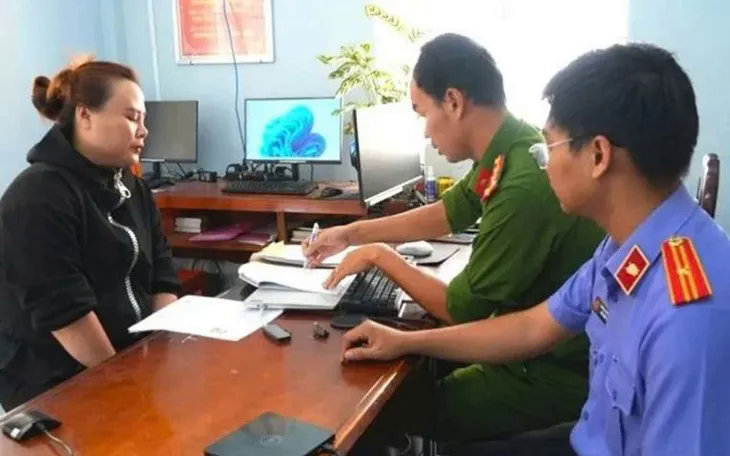The event witnessed the participation of representatives from supporting agencies and investment funds, including Aozora Bank (Japan), Dream Incubator, and Daiwa Corporate Investment, along with over 60 business owners and CEOs of SMEs in Vietnam.

Panel of speakers at the event.
|
The conference aimed to provide practical and useful information about the macroeconomic situation and monetary market in the upcoming time, as well as sharing financial solutions that OCB is offering to support SMEs. Additionally, it opened up more M&A opportunities between Vietnam and Japan in the future.
The Development “Knot” for SMEs
As of June 2024, Vietnam has nearly one million businesses. The SME segment, with a revenue of under VND 20 billion, accounts for about 83-85%, and those with a revenue of under VND 25 billion make up to 95%. This shows that SMEs can be considered the potential backbone of Vietnam’s economy in the coming time.
“The SME segment in Vietnam is very dynamic, but it is also the most “vulnerable” segment because: Over 80% of SMEs are established within 3 years; Businesses with paid-up capital of under VND 10 billion account for about 95%. This indicates the “endurance” of this segment in difficult conditions is thin, making it the most affected and “vulnerable” segment. In addition, businesses with revenue under VND 10 billion account for 72%, showing that there are numerous micro SMEs in Vietnam. However, the ratio of profit recorded in the tax report for two consecutive years is less than 1%,” said Mr. Le Dang Khoa, Director of SME Customer Segment, OCB, at the event.
According to Mr. Le Dang Khoa, one of the reasons why SMEs have to leave the market is their choice of an inappropriate business model. Many enterprises tend to focus on solving one market problem or providing a solution or product that they believe has a significant competitive advantage in the market. This often leads to an extremely high failure rate. Other risks include relying too much on a single leader, failing to develop core human resources, falling behind in science and technology, and limited financial management capabilities, especially in cash flow management.

Mr. Le Dang Khoa, Director of SME Customer Segment, OCB, shared at the event.
|
Understanding these issues, OCB has developed financial solution packages with the orientation of “A Companion Throughout the Journey with Enterprises.” Accordingly, the bank will not only provide standalone products, specifically credit provisions, but OCB will focus on offering comprehensive financial solutions, including loan support, cash flow management, and consulting solutions to help enterprises leverage technology to connect the ecosystem between businesses, customers, and partners, optimizing customer experience and financial management efficiency. These solution packages will be designed by OCB according to each customer’s unique needs and characteristics.
Especially, OCB is one of the few banks in the system to pioneer the deployment of Open API – an open connection system of APIs between OCB and Fintech Companies/Partners to support the provision and use of banking services online through the Internet safely and standardly. It is the core technical foundation for implementing Open Banking. Currently, with more than 150 ready-to-integrate APIs, we can meet the diverse needs of partners from various industries. Open API products and services have been and will continue to meet the needs of all business customer segments across industries with powerful processing efficiency: Handling an average of over 2 million transactions/month since the beginning of 2024. In August 2024 alone, we recorded nearly 3 million transactions; The total transaction value in the first eight months of 2024 was over VND 18,000 billion. With these strategies and technology platforms, the bank will accompany and support its customers from the startup phase to becoming a large and robust enterprise. OCB expects that startup enterprises will not only become customers but also long-term partners of the bank, emphasized Mr. Khoa.
Breaking Down Barriers in M&A Between Vietnamese and Japanese SMEs
At the conference, Mr. Jun Okuda, representing the Private Equity Fund Management Company – Daiwa Corporate Investment, said that Vietnam is currently a potential strategic partner for Japanese SMEs. Japan is expanding its business to other countries, and Vietnam is the second country (after the US) that Japan will invest in most heavily. “Japanese investors are looking at countries with raw materials sources. Accordingly, Vietnam is in the Top 2, only after China,” added Mr. Jun Okuda.
In reality, M&A between Vietnamese and Japanese SMEs still faces many barriers due to differences in politics, regulations, economics, culture, history, language, business characteristics, management methods, and financial capabilities. Specifically, the average age of Japanese companies is 34 years, while the average age of Vietnamese companies is 10 years. Therefore, the owners of Japanese companies are mostly from the fourth to fifth generations (aged 50-60), while in Vietnam, they are from the first generation, aged 30-34. This will create differences in business planning decisions. SME management in Vietnam also has many specifics, and young enterprises still manually keep books and have not digitized them. Moreover, borrowing is challenging because collateral or guarantees are required, but the financial capacity of the enterprises has not met the expectations of investors. All of these lead to a lack of trust from investors, directly affecting investment decisions.
“To address these issues and open the door to investment from foreign businesses in Vietnam, enterprises, in general, and SMEs, in particular, need to apply international standards to increase reliability and transparency. This will create opportunities to prove themselves to banks to obtain long-term loans. At the same time, they should look for ways to penetrate the Japanese market and embrace brands and technology from Japan…,” said Mr. Jun Okuda.
In fact, investment loans in Japan usually have very low-interest rates and diverse investors. Through cooperation and joint ventures between enterprises of the two countries, there will be opportunities to access good capital sources that match their orientation. Especially, Vietnamese enterprises can also find development opportunities on the Tokyo Stock Exchange – one of the best stock exchanges in Asia today.
Currently, some Vietnamese enterprises have planned to list on the Tokyo Stock Exchange, which could be a necessary boost for enterprises to develop more robustly in the future. This will also create a competitive advantage over their competitors in the market and generate more significant revenue growth.
Also, at the conference, a series of questions from enterprises were raised for the experts through the panel discussion, such as the criteria for evaluating and appraising investment opportunities for foreign enterprises, challenges in investing in the Vietnamese market, and OCB’s credit incentives when enterprises borrow capital with Japanese investors…
 Guests asking questions to the speakers during the panel discussion.
|
OCB is a pioneer bank in organizing conferences for SMEs to open up M&A opportunities between Vietnam and Japan. OCB has a professional FDI team, fluent in multiple languages, and provides “one-stop-shop” services through Japan Desk, Korean Desk, Taiwan Desk, and MNC Desk. This enables OCB to offer comprehensive financial solutions to customers, including account, cash flow, liquidity, trade finance, and foreign exchange management. Currently, OCB and AOZ are very successful in serving Japanese and Korean business customers and are expected to continue expanding strongly in the coming time.
What Message Does the Bank Want to Convey Through This Year’s Hanoi International Marathon – Techcombank?
Mr. Pham Xuan Tai, the Deputy Director of the Hanoi Department of Culture and Sports, emphasized that this year’s run is more than just a sporting event; it holds a special significance.
“Sophisticated Scam Alert: Uncovering the Deceptive Practice of Biometric Authentication Workarounds and Brand Name Bank Account Fraud”
The residents of Ha Tinh have fallen victim to a spate of scams, perpetrated by individuals who create fake companies and open bank accounts under the guise of well-known brands such as Mailisa cosmetics and ABX electric vehicles. These scammers exploit the reputation of popular names to deceive unsuspecting individuals online.
Sustainable Digital Finance: Unlocking New Momentum for Vietnam’s Banking and Finance Industry
The digital shift has become an inevitable trend in Vietnam’s banking and finance sector. To sustain their growth, banks must adopt a comprehensive strategy. MB has released a report titled “The Shift to Sustainable Digital Finance for Vietnam’s Banking and Finance Sector,” offering new insights and direction in this digital era.

















